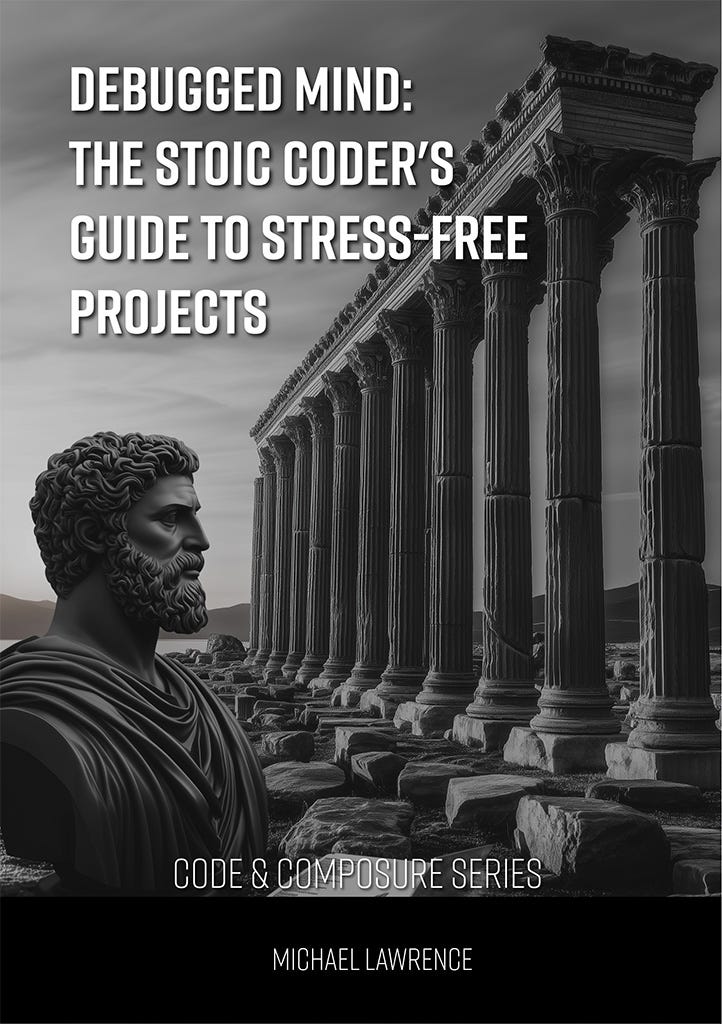From Bug Fixes to Life Philosophy: Why I Wrote "Debugged Mind"
The Mental Tools They Don't Teach in Bootcamp (But Should)
Several years back, I watched a brilliant developer completely melt down during a production incident. Sarah had been coding for eight years, knew our system inside and out, and could debug complex issues faster than anyone on the team. But when the payment processor started throwing 500 errors during our clients biggest sale of the quarter, she just... froze.
Not technically—she was typing furiously, rolling back deployments, checking logs, doing all the right things. But I could see the panic in her eyes, the way her shoulders tensed up, how she snapped at anyone who tried to help. She fixed the issue in twenty minutes, but spent the rest of the week second-guessing herself and stress-eating at her desk.
This isn't a story about Sarah's technical skills. It's about something we rarely talk about in our industry: how we handle the inevitable chaos of software development. And honestly, it's a story about most of us.
The Thing Nobody Taught Us
We spend years learning frameworks, algorithms, design patterns. We debate tabs vs spaces, argue about microservices, and stay up late reading documentation. But nobody teaches us how to stay calm when everything's on fire. Nobody shows us how to handle constantly changing requirements without losing our minds. And definitely nobody prepares us for the emotional rollercoaster of having your carefully crafted code torn apart in a code review.
I've been writing code for 25 years, and I've seen incredibly talented developers burn out, quit the industry, or just become cynical and bitter because they couldn't handle the human side of this job.
Hell, I've been close to doing these as well. The stress, the uncertainty, the impostor syndrome, the endless learning curve—it eats people alive.
That's why I wrote "Debugged Mind."
Ancient Wisdom Meets Modern Code
Here's what I discovered during my own career journey: the problems we face as developers aren't actually new. Different tools, same human struggles.
The anxiety about not knowing enough? The frustration with scope creep? The pressure of deadlines?
People have been dealing with uncertainty, change, and high-stakes situations for thousands of years.
The Stoics, philosophers from ancient Greece and Rome, figured out remarkably practical approaches to exactly these challenges. They developed mental frameworks for staying calm under pressure, techniques for focusing on what you can actually control, and ways to find meaning in your work regardless of external chaos.
When I started applying Stoic principles to my development work, everything changed. Not the technical aspects; I was still writing the same code, working with the same technologies. But my relationship to the work transformed. Think of it as emotional version control for your career; you get the same functionality, but with way better stability and rollback options when things go wrong.
What This Book Actually Does (And Doesn't Do)
"Debugged Mind" isn't about meditation retreats or becoming a philosophy scholar. It's not about detaching from your work or pretending problems don't matter. It's about developing unshakeable core stability that lets you engage fully without being overwhelmed.
Let me give you a concrete example. Your product manager comes over and says they need to change the core feature you've been working on for three weeks. Again. For the third time this sprint.
Most of us would internally scream something about their incompetence, maybe stress-eat some snacks, and spend the next hour complaining to teammates. But with Stoic tools, you'd pause and ask: "What can I actually control here?" You can't control their decision-making process, but you can control how you communicate about the technical implications. You can't control the timeline pressure, but you can control whether you let it make you sloppy or anxious.
The book walks through real developer scenarios like this one, showing you specific techniques for staying calm during production incidents, methods for communicating clearly when tensions are high, and approaches for finding satisfaction in your craft regardless of external recognition.
Who This Is Really For
This book is especially written for developers early in their careers, though honestly, I wish I'd had these tools twenty years ago. If you're feeling overwhelmed by the constant learning demands, stressed about whether you're "good enough," or frustrated by the gap between how development should work and how it actually does, this is for you.
It's also for anyone who's tired of their mood being dictated by deployment success, code review feedback, or whether their latest feature gets used. Basically, if you've ever found yourself thinking "there has to be a better way to handle all this," you're right. There is.
The Real Promise
I'm not promising this will make development easy. Good software is hard to build, and there will always be challenges, setbacks, and moments of genuine difficulty. But what if those challenges didn't have to be sources of chronic stress? What if you could maintain your passion for the craft without burning out? What if you could find genuine satisfaction in your work regardless of whether your startup succeeds or your code gets recognized?
That's what Stoic principles offer: not the elimination of difficulty, but the skills to navigate it with wisdom and composure. The practices you'll learn for handling technical challenges apply to everything else in life. Learning to respond rather than react, focusing on what you can control, finding meaning in the process rather than just outcomes—these become part of how you approach the world.
Beyond the Code
At the end of the day, we're not just developers. We're human beings who happen to solve problems with code. The quality of our lives—and ultimately, the quality of our work—depends as much on our mental approach as our technical skills.
"Debugged Mind" is my attempt to share what I've learned about combining ancient wisdom with modern development challenges. It's a guide for building not just better software, but a more sustainable and fulfilling career in an industry that can be both incredibly rewarding and completely overwhelming.
Your codebase will evolve, technologies will change, but the human challenges remain constant. This book is about developing the inner tools to handle whatever comes next; with competence, composure, and maybe even a little wisdom.
The next time you're staring at a broken build at 11 PM, you'll have tools that most developers never learn. And trust me, that makes all the difference.
Debugged Mind: The Stoic Coder's Guide to Stress-Free Projects is available on Amazon. Whether you're just starting your development journey or you're a seasoned engineer looking for a more sustainable approach to the craft, these time-tested principles offer a path to both technical excellence and personal well-being.
👉 If you enjoy reading this post, feel free to share it with friends!
Or feel free to click the ❤️ button on this post so more people can discover it on Substack 🙏
You can find me on X and Instagram.



